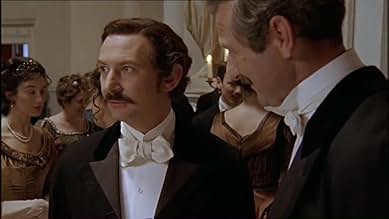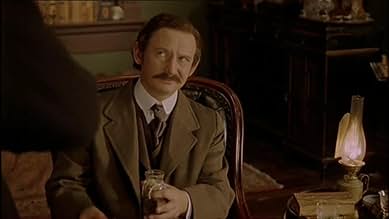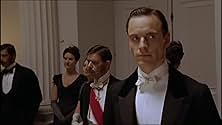CALIFICACIÓN DE IMDb
6.7/10
2.9 k
TU CALIFICACIÓN
Agrega una trama en tu idiomaA serial killer stalking the teen-aged daughters of the aristocracy brings Sherlock Holmes out of his drug-filled semi-retirement.A serial killer stalking the teen-aged daughters of the aristocracy brings Sherlock Holmes out of his drug-filled semi-retirement.A serial killer stalking the teen-aged daughters of the aristocracy brings Sherlock Holmes out of his drug-filled semi-retirement.
- Dirección
- Guionistas
- Elenco
- Premios
- 3 nominaciones en total
Tamsin Egerton
- Miranda Helhoughton
- (as Tasmin Egerton)
Andrew Wisher
- Constable
- (as Andy Wisher)
- Dirección
- Guionistas
- Todo el elenco y el equipo
- Producción, taquilla y más en IMDbPro
Opiniones destacadas
I am a really avid fan of all things Sherlock Holmes. I have all the Basil Rathbone/Nigel Bruce original movies and all the Jeremy Brett Telefilms and series.
I also have the excellent 1959 Hammer 'HOUND OF THE BASKERVILLES' with wonderful Peter Cushing as Sherlock Holmes (FWIW, I have like 8 different versions of that movie... : ) And, the later, not as well known 1985 film 'THE MASKS OF DEATH' also starring Peter Cushing as Holmes.
And, a LOT more... :D
So, in going into this movie I was curious as to how Rupert Everett would be in the starring role. Well, I honestly thought he did a very good job. Watson actually took a bit longer to get used to, but both I feel did a genuinely good job in portraying these famous characters.
Also, what gives the movie a lot of strength is the story itself. Not to mention, the excellent atmosphere and the very adept way it was directed and written.
Another thing I really liked was that with the way the characters were developed, you really had a strong emotional connection to both the good and the bad guys. I tell you, that one Duke or whomever the hell he was was SO damn pompous, I swear I really wanted to kick his bottom! So yes, the characterization all around was done very well.
A very compelling story, almost along the lines of a Jack the Ripper with a very effective atmosphere, something if you are a Holmes fan at all you should really find entertaining.
I gave it a strong '7'
~~~~~~~~~~~~~~~~~~~~~~~~~~MY PARTICULAR WAY OF RATING:
5 - Flawed, but with some entertainment value.
6. A decently passable story maybe worth a watch.
7. A solid film, well made, effective, and entertaining.
And, obviously, you can probably figure out what above and below these would mean... : )
I also have the excellent 1959 Hammer 'HOUND OF THE BASKERVILLES' with wonderful Peter Cushing as Sherlock Holmes (FWIW, I have like 8 different versions of that movie... : ) And, the later, not as well known 1985 film 'THE MASKS OF DEATH' also starring Peter Cushing as Holmes.
And, a LOT more... :D
So, in going into this movie I was curious as to how Rupert Everett would be in the starring role. Well, I honestly thought he did a very good job. Watson actually took a bit longer to get used to, but both I feel did a genuinely good job in portraying these famous characters.
Also, what gives the movie a lot of strength is the story itself. Not to mention, the excellent atmosphere and the very adept way it was directed and written.
Another thing I really liked was that with the way the characters were developed, you really had a strong emotional connection to both the good and the bad guys. I tell you, that one Duke or whomever the hell he was was SO damn pompous, I swear I really wanted to kick his bottom! So yes, the characterization all around was done very well.
A very compelling story, almost along the lines of a Jack the Ripper with a very effective atmosphere, something if you are a Holmes fan at all you should really find entertaining.
I gave it a strong '7'
~~~~~~~~~~~~~~~~~~~~~~~~~~MY PARTICULAR WAY OF RATING:
5 - Flawed, but with some entertainment value.
6. A decently passable story maybe worth a watch.
7. A solid film, well made, effective, and entertaining.
And, obviously, you can probably figure out what above and below these would mean... : )
I really liked that movie. The way Sherlock Holmes is portrayed here strongly reminds me of the 2010 TV show, called Sherlock (which is really great). In contrast to every other Sherlock movie I've watched before, this one resembles the 2010 Sherlock the best and I really like that version of him.
Rupert Everett's replacement of Richard Roxburgh for a second post-Jeremy Brett installment of big budget Holmes adaptation is quite a wise one, adding as it does a touch of youthful energy to the detective's armoury. Indeed, the whole film runs at a cracking pace, dropping clues like confetti. But what really makes this adaptation shine is a growing sense of purpose in terms of atmosphere. Arthur Conan Doyle's creation is plunged further into its roots as a purveyor of the grotesque and shocking. Corpses, evil smiles (and that's just Ian Hart's Watson!), drug use, great music score, and plenty of dense smog enhance the proceedings further than the decent acting or script. Well worth a look on a dark night...
While the main stars differ somewhat from the stereotypical Holmes and Watson, one hardly gets a chance to ponder this, as this little gem is fascinating from the start.
Excellent acting and a plot which is solid and built up in such a manner that the viewer is enticed to think along with Mr. Holmes make this BBC production quite a perfect installment in the series.
Everett and Hart show great chemistry and I wouldn't mind the BBC to carry on making more Holmes movies in this manner - if anyone over there happens to read this - keep 'em coming!
9/10 easily.
Excellent acting and a plot which is solid and built up in such a manner that the viewer is enticed to think along with Mr. Holmes make this BBC production quite a perfect installment in the series.
Everett and Hart show great chemistry and I wouldn't mind the BBC to carry on making more Holmes movies in this manner - if anyone over there happens to read this - keep 'em coming!
9/10 easily.
Apart from the names Sherlock Holmes and Dr Watson, there's really nothing to connect this original BBC TV movie to the original Conan Doyle stories. It's a return to the old wartime Basil Rathbone films, set in the wrong period, packed with anachronistic detail, and which fails to pay even lip service to Holmes's famous method. It's a poorly written modern police drama right down to the obligatory, clunking serial killer plot. It's just dressed in period costume. Even the plot twist about the killer's identity comes in Edwardian dress, as it could only ever possibly fresh and original in disguise pretending to be a story written a hundred years ago.
The story constantly forces modern elements incongruously into Holmes's necessarily, fundamentally low tech world. The story is set some time after the Victorian era of the classic Holmes stories, apparently to justify the use of telephones and modern police techniques like fingerprinting. Watson is about to marry an American psychiatrist, which opens the door to the modern serial killer psychodrama whose emphasis is on woolly sexual motivation and grotesque patterns of behaviour, worlds away from the traditional Holmes story where logic and deduction solve single victim locked room murders. The oddly un-Edwardian London police set up an incongruous, modern incident room to collate the information about their spiralling body count. In one scene Holmes spins around this room staring helplessly at photographs and maps, unable to connect fact and incident, which reduces the finest logical detective mind in the world to the level of "Inspector X" in any paint-by-numbers police series. Eventually Inpector Lestrade himself time-travels to the 1970s to give a suspect an Sweeney-style kicking to make him talk.
Rupert Everett as Holmes drifts through the first half of the story like someone on a mixture of recreational drugs, which is clearly the writer's deliberate intention. Trying to exploit the radical elements in Holmes's character the story inflates his drug use out of proportion. Conan Doyle saddled his creation with a habit of injecting cocaine, but there is never any suggestion that Holmes had a narcotic monkey on his back. He claims his 7 per cent solution stimulates his mind in times of boredom, a world away from the use of soporifics to deaden his brain.
Ironically it seems that in order to make these seasonal specials featuring Holmes himself the BBC abandoned its own excellent Holmes homage, the quite superb Murder Rooms, which succeeded in every respect that this film fails, injecting modern style and sensibilities while still honouring the source material. They were faithful in period detail and in many respects to the type of detective story which suits the Holmes character, and where they took a post-modern approach were able to underscore rather than undermine the quality of the original. It begs the question, as they clearly have access to writers with the talent to produce this kind of work, why didn't they use them here? Even more ironically, in the UK while this film was one of the main planks of the BBC's Christmas 2004 season evening schedule, the BBC have also been showing daytime repeats of Jeremy Brett as Sherlock Holmes. The strength of this performance, and the faithfulness to the original material, casts the poor work here into sharp relief.
The story constantly forces modern elements incongruously into Holmes's necessarily, fundamentally low tech world. The story is set some time after the Victorian era of the classic Holmes stories, apparently to justify the use of telephones and modern police techniques like fingerprinting. Watson is about to marry an American psychiatrist, which opens the door to the modern serial killer psychodrama whose emphasis is on woolly sexual motivation and grotesque patterns of behaviour, worlds away from the traditional Holmes story where logic and deduction solve single victim locked room murders. The oddly un-Edwardian London police set up an incongruous, modern incident room to collate the information about their spiralling body count. In one scene Holmes spins around this room staring helplessly at photographs and maps, unable to connect fact and incident, which reduces the finest logical detective mind in the world to the level of "Inspector X" in any paint-by-numbers police series. Eventually Inpector Lestrade himself time-travels to the 1970s to give a suspect an Sweeney-style kicking to make him talk.
Rupert Everett as Holmes drifts through the first half of the story like someone on a mixture of recreational drugs, which is clearly the writer's deliberate intention. Trying to exploit the radical elements in Holmes's character the story inflates his drug use out of proportion. Conan Doyle saddled his creation with a habit of injecting cocaine, but there is never any suggestion that Holmes had a narcotic monkey on his back. He claims his 7 per cent solution stimulates his mind in times of boredom, a world away from the use of soporifics to deaden his brain.
Ironically it seems that in order to make these seasonal specials featuring Holmes himself the BBC abandoned its own excellent Holmes homage, the quite superb Murder Rooms, which succeeded in every respect that this film fails, injecting modern style and sensibilities while still honouring the source material. They were faithful in period detail and in many respects to the type of detective story which suits the Holmes character, and where they took a post-modern approach were able to underscore rather than undermine the quality of the original. It begs the question, as they clearly have access to writers with the talent to produce this kind of work, why didn't they use them here? Even more ironically, in the UK while this film was one of the main planks of the BBC's Christmas 2004 season evening schedule, the BBC have also been showing daytime repeats of Jeremy Brett as Sherlock Holmes. The strength of this performance, and the faithfulness to the original material, casts the poor work here into sharp relief.
¿Sabías que…?
- TriviaIn the film's opening scene, Holmes is seen smoking opium. It is subsequently implied that this is a regular occurrence. This represents a contrast from the character of the Conan Doyle stories, in which his drugs of choice were morphine and cocaine. In the stories, Holmes only smokes opium once as part of a disguise.
- ErroresThe police are seen using telephones in 1902, but in reality, the first phone was not installed at New Scotland Yard until 1903.
- Citas
Sherlock Holmes: There should be no combination of events for which the wit of man cannot conceive an explanation.
Sherlock Holmes: Really, Watson, you are scintillating this morning.
- ConexionesFeatured in Timeshift: A Study in Sherlock (2005)
- Bandas sonorasString Quartet No.14 in D Minor,'Death and the Maiden', the 4th Movement
Composed by Franz Schubert
Selecciones populares
Inicia sesión para calificar y agrega a la lista de videos para obtener recomendaciones personalizadas
Detalles
- Fecha de lanzamiento
- Países de origen
- Idioma
- También se conoce como
- The Return of Sherlock Holmes
- Locaciones de filmación
- Queen Alexandra's House - Hall of residence, Bremner Road, Kensington, Londres, Inglaterra, Reino Unido(The intimate dungeon, where the crook was shot in the leg.)
- Productoras
- Ver más créditos de la compañía en IMDbPro
Contribuir a esta página
Sugiere una edición o agrega el contenido que falta






























